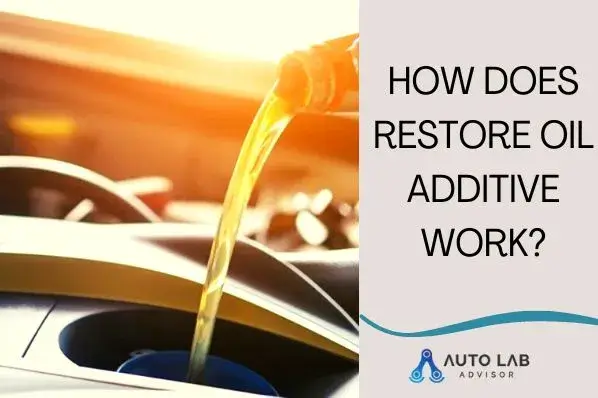There are two views on engine oil additives among vehicle owners and car mechanics. One group of car enthusiasts believes that they notice improved engine performance by adding oil additives to the engine. But on the flip side, some think it is just a gimmick and isn’t worth the hype.
Is it really a gimmick?
How does Restore oil additive work?
Which are the advantages and cons of adding engine oil additives?

How Does Restore Oil Additive Work?
Before answering, does Restore oil additive really work?, you must know this oil additive is.
Oil Additives and Engine Oil
The main reason behind adding engine oil to the engine is to protect the engine parts from friction. Apart from this, engine oil offers protection against contamination, corrosion, and sludge buildup. However, engine oil alone cannot provide all of these benefits. It requires oil additives to offer all these benefits.
Usually, engine oil has 15% to 20% oil additives in its composition. But over time, due to oxidation, separation, and adsorption, these oil additives start to diminish from the engine oil composition. But without the oil additives, fuel economy will get lower. Besides, your car’s engine will suffer from overheating, sludge formation, corrosion, and breakdowns. This is why you should add oil additives along with the motor oil.
Reasons Why Engines Lose Compression
For optimum combustion, engine needs to have maximum compression. And for maximum compression, seals between the cylinder wall and piston ring must be tight. Without the tight seal, there will be a gas leak, resulting in fuel waste and sludge formation.
When you have a newer engine, seal between the cylinder wall and piston ring will be tight. However, as time goes by, this seal starts to wear out, and because of this, the engine fails to achieve maximum compression. For better understanding, let’s see what is happening on the micro-scale.
The cylinder walls and the piston ring have peaks and valleys. When you start the engine, these peaks and valleys slide over each other at a very high speed. Here, engine oil works as a hydrodynamic boundary between the cylinder walls and piston ring. But as time goes by, engine oil film breaks down and allows the cylinder and the piston ring to collide with each other. As a result, friction increases and the seals loosen.
As the Top Dead Center or TDC has the least amount of lubrication, it has more friction and produces more heat, resulting in severe engine wear and tear.
How Restore Oil Additives Ensure Proper Seal
As stated above, over time, due to friction, the seal between the cylinder walls and piston ring becomes loose, resulting in inadequate compression. When the engine compression is low, your car engine will have less power and won’t get enough acceleration. Here, Restore oil additives come into play.
CSL formula in Restore oil additives allows the oil additive to fill the leaks of the engine. Besides, it lubricates the TDC and controls the engine overheating issue.
8 Benefits of Using Restore Engine Oil Additive
- Seals the leaks
- Eliminates sluggish acceleration
- Removes sludge formation
- Repairs the worn-out engine parts
- Lubricates the Top Dead Center
- Increases the compression ratio
- Makes the engine quieter
- Helps the engine to generate more power
Restore Engine Restorer – How to Use
You will have to add an oil additive during the engine oil change. It is advised to use a 20% oil additive and 80% engine oil mixture.
6 Benefits of Adding Oil Additives
- Extends the engine oil lifespan
- Prevents sludge formation
- Eliminates crankshaft foaming issue
- Reduces the engine parts’ friction
- You can add oil additive with both synthetic and mineral engine oil
- Improves the engine parts condition
Disadvantage of Oil Additives
If there is too much anti-foaming concentration in the oil additive, it can make the foam formation even worse. Besides, excessive Sulphur content in the oil additive can decrease the engine’s fuel efficiency.
What is the Best Engine Restore Additive?
We recommend you to use the Restore 00015 6-Cylinder Formula Engine Restorer and Lubricant. This engine oil additive doesn’t have excessive Sulphur content. Thus, there is zero probability of fuel efficiency loss. With this engine oil additive, you can get optimum engine performance and maximum fuel efficiency.
Frequently Asked Questions about Oil Additives
Yes, the Restore oil additive is safe to use in the engine. It is developed by a group of scientists and experienced automotive engineers. This engine oil doesn’t have PTFE, ZDDP, Naphthalene, Acetone, and Sulphur. As a result, there is no risk of engine parts damage or a decrease in fuel efficiency.
The key difference between the 4-cylinder and 6-cylinder is the size of the engine oil additive. You can purchase according to your demand. There is no difference in formula between the two oil additive style.
No, the engine oil viscosity grade will remain the same even after adding the oil additive.
While adding the engine oil, ensure that it has the right viscosity grade because if the viscosity doesn’t match the weather condition, it will damage the engine components. For example, if you are driving in winter, you should use an engine oil that has a lower viscosity. Otherwise, engine oil will coagulate and cause engine overheating.
Yes, you can add Restore oil additive with synthetic and mineral engine oil.
Conclusion
Engine oil additives boost engine performance. If you are not adding engine oil additives, you should start adding oil additives for better performance and efficiency. However, while adding engine oil additives, ensure that you maintain an 80/20 ratio. Also, before purchasing the oil additive, ensure that there is no Sulphur in the oil additive. Otherwise, it can damage the engine parts and reduce the engine performance.
